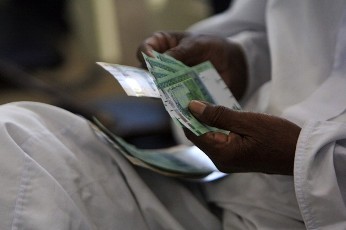Sudan’s finance minister downbeat over country’s economic outlook
May 7, 2014 (KHARTOUM) – Sudan’s finance minister, Badr al-Din Mahmoud, has painted a bleak picture of the current economic situation, saying the country’s economy faced foreign, natural and political pressure which has created a budget hole and a $1.6 billion trade deficit coupled with a stagnation in non-oil exports except for gold.

The finance minister said in a report submitted to the parliament on Wednesday that they used 4.1 billion pounds of which 2.1 billion were loans and 2 billion in the form of grants.
Minister of foreign trade Osman Omar al-Sharif disclosed in a separate report that the value of non-oil exports dropped last year from $3.11 billion to $3.07 billion.
Al-Sharif also noted a decrease in trade volume between Sudan and the COMESA countries from $283 million during January-September 2012 to $135 million for the same period in 2013.
Sudan’s exports to Arab nations went down from $1.897 billion to $1.282 billion while imports increased from $1.178 billion to $1.491 billion thus turning the surplus into a $209 million deficit.
Observers say that officials in Khartoum generally tend to present a rosy image of the economy that is not reflective of reality. The former finance minister, Ali Mahmood Abdel-Rasool, told a local newspaper in an interview last year that this is done to prevent scaring people and markets.
In recent weeks, the Sudanese pound reached record lows against the US dollar on the black market, which is seen as a vital indicator to gauge the state of the economy.
Sudan imports most of its food from abroad which uses up a large chunk of its foreign exchange reserves and leaves little left to fulfill local demand by individuals and businesses alike.
Inflation has long remained in the double-digits despite slightly lowering in recent months.
The International Monetary Fund (IMF) said in a report on Sudan last year that the 2013 inflation rate is expected to be 32.1% compared to 35.1% in 2012.
Last month, a survey of the market done by Sudan’s official news agency (SUNA) showed large increases in the price of basic commodities.
Since the secession of the oil-rich south in July 2011, the government in Khartoum has sought to ease fiscal pressures by introducing unpopular austerity measures which included lifting food and fuel subsidies.
But critics say that the economic policies implemented have failed to contain inflation or exchange rate except to hurt the vast majority of the population.
Sudan’s lukewarm relations with the west and even some rich oil Arab Gulf states, as well as its hefty debt burden, made it unable to receive significant loans to support its budget or foreign exchange reserves.
Last February, it was revealed that a number of Saudi and European banks had decided to stop dealing with Sudanese banks.
Sudanese officials attributed the move to pressure by the United States which has economic sanctions imposed on the East African nation since 1997.
A Western diplomat told Agence France Presse (AFP) at the time that the move by the European banks appears to reflect an increasingly cautious attitude by financial institutions which do not want to risk being found in violation of US sanctions.
For Saudi Arabia, strained political relations over Sudan’s links to Iran could be a factor in the banks’ decision, the Western diplomat said.
(ST)

